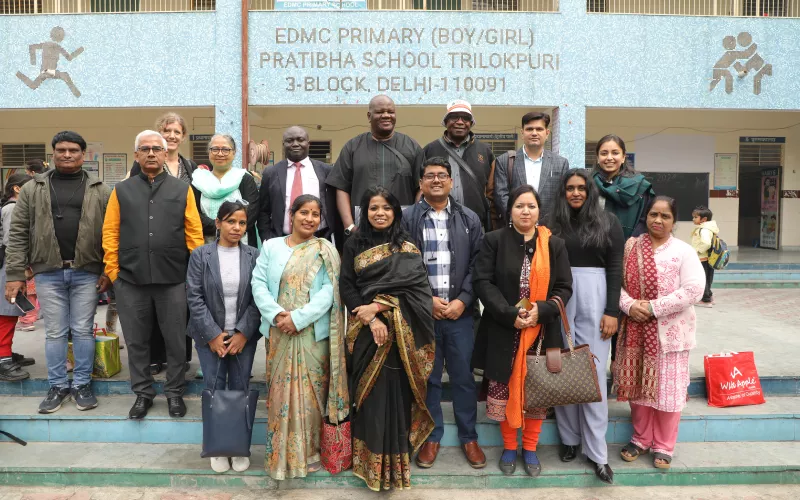Join our newsletter
By subscribing you agree to our Privacy Policy

In February 2024, a delegation from Zambia's Ministry of Education, along with VVOB and Teaching at the Right Level (TaRL) Africa, embarked on a learning journey to India to discover how an accelerated remedial education initiative has been scaled successfully and what could be applied in Zambia to scale up. One of the reoccurring messages that came through from this visit was the need to engage parents, caregivers and the wider community in education initiatives. As we marked Global Parents Day on 1 June 2024, we take stock of this message, including it in the key takeaways of the exchange visit.
This visit comes some eight years after a preliminary one where two Zambian Ministry of Education officials undertook their first trip to India to learn about the accelerated learning approach for foundational skills acquisition called TaRL. That journey ignited the beginnings of what is now known as Zambia’s Catch Up Programme. Today, Catch Up is reaching one-third of Zambian primary and community schools (5,716 schools) nationwide, making big strides since its pilot in 2016-17, reaching 80 schools.
The visit, which took place from 11 to 17 February 2024, focused on programmes supported by the Indian education Non-Governmental Organisation, Pratham Education Foundation. The delegation included senior Ministry of Education officials namely Mr. Kezala Kelly Mwale, Director of Primary Education, and Father Anthony Tambatamba, Assistant Director of Teacher Education and Specialised Services, as well as Mahuba Hazemba, Government Liaison Officer for TaRL Africa, and Caroline Elliot, Country Programmes Manager for VVOB in Zambia.
Zambia’s government-led adaptation of the TaRL approach, the Catch Up programme, helps learners acquire basic reading and math skills quickly and sustainably. In TaRL interventions, learners are assessed and subsequently grouped by their current learning levels rather than by grades or age. Level-appropriate, play-based activities are then conducted using low-cost and easy-to-make materials to assist learners’ progression from one group to the next.
TaRL’s adaptability and effectiveness have led to its up take in over 30 languages and implementation across various contexts globally, particularly in Sub-Saharan Africa, by both governmental and non-governmental entities. In Zambia too, Catch Up has been “contextualised” to suit the needs of the country. As Catch Up grows in Zambia, there is an opportunity to strengthen its delivery at scale. This was also one of the key learning objectives for the delegates, along with a better understanding of how different levels of government actors could support the delivery of education programmes.
Mahuba Hazemba, Government Liaison Officer for TaRL Africa, said that this new visit was different from the first as the government delegates received a lot of insights on the devolution process, which allows councils and municipalities to run early childhood and primary education programmes. “We also observed strategies, which can easily be adopted in Zambia, to improve mentoring and coaching, school leadership training and in-state education training,” he explained.
The diverse learning activities during the visit commenced with a courtesy call on the Zambian High Commissioner to India. During this engagement, delegates and staff of the high commission reiterated their commitment to enhancing foundational learning in the country and recognised the significance of South-South collaborations to strengthen policy interventions and quality educational practices on foundational learning.
Over the next few days, delegates delved into the diverse aspects of education programming. In New Delhi and Andhra Pradesh, where the state governments are implementing TaRL programmes with support from Pratham, delegates observed TaRL sessions in public schools in Trilokpuri (New Delhi) and Vijayawada. To learn from other innovations being tried in India, the delegation also visited Pratham’s work with early years, communities and youth. This included project visits to see interventions with learners in grades one and two, mothers’ groups, and skilling centres for youth.
To triangulate their learnings, delegates interacted with government representatives and bureaucrats from Delhi and Andhra Pradesh, senior leadership at Pratham, teachers and delivery staff. Conversations with community members participating in programmes, such as parents, also helped delegates gain insights about community engagement and mobilisation.
The delegates appreciated the government-led implementation and sustainability efforts for TaRL programmes in India. Although there were contextual differences in implementation, learner progression was still evident.
According to Caroline Elliot, Programmes Manager for VVOB in Zambia, the visit was an eye-opening experience in how it conveyed the need for community engagement when it comes to scaling education initiatives. “There was a realisation that all stakeholders, including in communities, need to be very engaged and responsive. The community engagement which is one of the elements being implemented here in Zambia, also needs to be quickly rolled out for the sustainability of TaRL. In other words, for the programme to be sustainable, everyone must be behind it.” Other key reflections when it came to scaling and sustaining TaRL approaches, included:
The Ministry of Education Director-Primary Education, Mr. Kezala Mwale appreciated the visit saying: “The trip was worth taking. We saw how our colleagues are advanced in TaRL, using a multi-sectoral approach. We are encouraged to equally advance in Catch Up. The commitment of Government is already evident from the provision of free education. We have learnt how to enhance Catch Up.”
Equipped with fresh insights from the visit such as including Catch Up in the core curriculum, having non-teaching monitors and coaches as well as enhanced Continuing Professional Development trainings, the next steps will be putting into policy and practice what was learned. The recent visit to India has served as a transformative experience for the Zambian Government, offering valuable perspectives and inspiration for the refinement and expansion of the country’s Catch Up programme.
By subscribing you agree to our Privacy Policy
Julien Dillensplein 1 bus 2A
1060 Brussels
Belgium